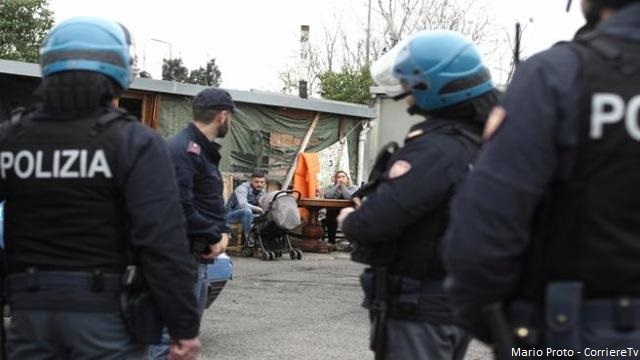A Return of the ‘Nomad Emergency’ in Italy?
23 May 2018
On March 5th, the day after the general elections, Italy woke up without a government. No party won the majority necessary to form a government in the country. The Movimento 5 Stelle (5-Star Movement), which took 32% of the votes, led by Luigi Di Maio, began to probe the various possible alliances to give them the necessary numbers in parliament. They settled on the Lega di Salvini (formerly Lega Nord) which took 17% of the vote. On cue, the Lega promptly left the center-right coalition it was a part of in order to forge ahead with a new coalition which promised them a coveted role in government.

After weeks of negotiations, breaks, dialogue, meetings, and discordant statements, the two leaders have signed a contract, in which they set out the basic points of their government program. The document, which runs to 57 pages, pays special attention to the problem of the so-called "nomad camps" in the chapter dedicated to "Security, legality and force orders”. Yes, this is still how our politicians speak about Roma, despite the National Strategy for Inclusion of Roma, Sinti and Caminanti approved by the Italian government in 2012. In a throwback to the days of Berlusconi, it seems that once again the Roma are to be considered as a security issue.
In short, the emergency security approach - that characterized the Nomad State of Emergency of 2008 to combat the so-called "Roma menace", and was declared illegal by the State Council in 2011 and by Italy's highest court in 2013 – is back.
Some would argue that this approach never really disappeared in Italy. The Strategy, which clearly laid out the need to overcome the emergency approach, has never been properly applied. Look at how Naples’ Gianturco informal camp, Milan’s Via Idro formal camp, or Foggia’s Roma ghetto were closed. This perhaps explains why in Italy it is so easy, from time to time when politics requires it, to use Romani populations as an easy scapegoat, as in this new government’s contract. The short paragraph dedicated to the “nomads” uses sensationalist and misleading information. It points to the spread of nomad camps in recent years as being directly proportional to an exponential increase in crimes committed. These camps according to the document cause "serious social problem with exasperated manifestations, especially in the urban suburbs involved." Of course absolutely no data is provided to justify these policy points.
The contracts reports that there are around 40,000 Roma living in these nomad camps, as if this were already a criminal fact in itself. In reality, around 26,000 live in such camps according to Associazione 21 Luglio in their recent report published in April 2018. The numbers in this report are publically available and easily accessible to the coalition. So why would they dream up a figure almost twice as large as the best estimate?
A further question, and another glaring omission from the document is: how many Roma are there in Italy? Is it only those visible to us in makeshift housing camps? Is it only those in segregated camps, or those persecuted by repeat forced evictions? Do we really only have 26,000 Roma in Italy?
Of course we don’t. Once again the data is easily available to anyone interested in the factual truth. According to a cursory reading of the National Strategy, about 120 – 180, 000 Roma, Sinti and Caminanti live throughout the Italian territories and only 3% of them are nomads. The vast majority are invisible. They work, study, and generally get on with their lives without being in the state spotlight, something which only the most vulnerable of the population are forced into. The new coalition contract is full of incoherent references and inaccurate information on Italy’s Romani communities. The lack of effort on their part to at least use accurate numbers is no accident, but a tool used to securitise Roma in state policy for cheap political gains.
The contract’s paragraph on Roma is short but devastating. Despite the approximations, half-guesses and outright lies regarding the data, they finish with the perfect recipe: the promise to close all irregular “nomad” camps in line with community directives; to crack down on ‘toxic’ sites; and to guarantee compulsory school attendance of minors by threatening to remove children from their families. Unsurprisingly, the contract does not go into specifics of how these camps will be closed, nor how the peculiar Italian camp system will be dismantled. And what about the people living there? Will be they consulted? Will they be given any say over their own fate? Or is it more likely we will see more of the same? Force evictions, homeless families, police harassment, and ethnically segregated container camps.
Every single camp, formal or informal, which has ever been ‘closed’ to date was forcefully evicted and its inhabitants left on the street or moved to segregated and precarious shelters. Di Maio and Salvini’s radical new solution for the so-called ‘nomad issue’ is to continue feeding into harmful and discriminatory stereotypes picturing Roma as criminals, and as bad parents unwilling to send their children to school. And then if all else fails, they will just drive them out, bulldoze their homes and worry about what to do with the consequences next year.




